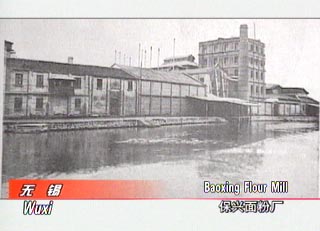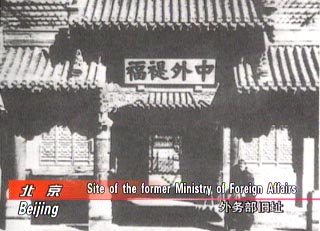 |
|
Delayed Reform (2)
Empress Dowager Cixi Returning to Beijing  |
| CCTV.COM 2002-05-17 08:05:43 |
|
Alfred von Waldersee, commander of the Eight-Power Allied Forces, stayed at the Hall of Virtuous Phoenix in Zhongnanhai for a period of time. This was Empress Dowager Cixi's favourite residence. The gorgeous hall was burned down in a big fire at midnight on April 17, 1901. Not a single photo of the hall was left behind.
After the War of 1900, the situation in South China was entirely different from that in North China. Officials in South China were not in favour of the imperial court declaring war. For this they received support from the media. Social life in Shanghai was very stable. A Hungarian brought two cars to Shanghai. The municipal authorities had to levy a tax on the cars as new-type carriages.
In the same year, the office building of China Merchants Steam Navigation Co. Ltd. was completed. The building doesn't attract much attention now, but it was one of the buildings along the bund constructed in those days.
In 1900, the grain yield in the vast areas of North China decreased sharply because of the drought and the war. Li Hongzhang, Governor-General of Zhili, ordered transportation of grain from the south to the north, exempt from taxation.
 Rong Chongjing and his brother Rong Desheng in Wuxi not far from Shanghai grasped the opportunity for business. In 1900, they began to import more than ten millstones from France and prepared for building Baoxing Flour Mill. The mill was completed two years later. It produced 300 sacks of flour a day. In the 1930s, the Rong family became a prominent national capital group in China. The trademark "Warship" has been in use for almost a century. Rong Chongjing and his brother Rong Desheng in Wuxi not far from Shanghai grasped the opportunity for business. In 1900, they began to import more than ten millstones from France and prepared for building Baoxing Flour Mill. The mill was completed two years later. It produced 300 sacks of flour a day. In the 1930s, the Rong family became a prominent national capital group in China. The trademark "Warship" has been in use for almost a century.
The conservative government-in-exile could not do as much as it would like to for the changing country. In ten days in July 1901, Liu Kunyi, Governor–General of Jiangsu, Anhui and Jiangxi provinces, and Zhang Zhidong, Governor-General of Hubei and Hunan provinces, submitted three memorials to the throne, calling for political reform. The media showed great concern for this development. The full texts of their memorials hit front-page headlines in the newspaper "Shen Pao". People saw a signal of reform.
Cixi returned to Beijing in January 1902. For the first time she took a train, the most up-to-date means of transportation in those days. The band struck up the Marseillaise. The militant tune composed during the French Revolution was played as a melody of welcome for Cixi. It seemed that many things were changing. The changes were imperative.
 As the first change, the Foreign Office was renamed the Ministry of Foreign Affairs to facilitate the handling of international affairs. Empress Dowager Cixi made frequent contacts with the wives of diplomatic envoys from other countries. To receive them in a better way, she ordered Rongling and Deling, daughters of Yu De, the Chinese minister to France, to keep her company. The two sisters had learned modern dance from Isadora Duncan during their stay in France. Rongling, the younger sister, performed ballet superbly. As the first change, the Foreign Office was renamed the Ministry of Foreign Affairs to facilitate the handling of international affairs. Empress Dowager Cixi made frequent contacts with the wives of diplomatic envoys from other countries. To receive them in a better way, she ordered Rongling and Deling, daughters of Yu De, the Chinese minister to France, to keep her company. The two sisters had learned modern dance from Isadora Duncan during their stay in France. Rongling, the younger sister, performed ballet superbly.
During her second-year stay in the imperial palace, Rongling performed ballet for the Empress Dowager. Their younger brother took many photos of her. All the photos of Cixi we see today were taken by him in 1903.
The turbulent northern part of the country began a recovery from the effects of the war. On June 17, 1902, a Manchu man who was sympathetic to the reformists started the publication of the newspaper "Ta Kung Pao" in Tianjin.
On the fifth day of publication, the newspaper published an article urging the Empress Dowager to resign her power. Under the stress of the circumstances, Cixi declared that she would initiate reform, but her reform started from women's feet.
|
|
|
|
|
|
|
 |









